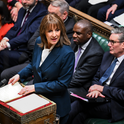The prospective abandonment of Ukraine to Vladimir Putin by Donald Trump has an eerie resonance of Neville Chamberlain handing Czechoslovakia to Adolf Hitler in 1938. And we all know what happened a year later.
Unsurprisingly, therefore, alarmism has reigned supreme since Trump’s friendly phone call to Putin earlier this month. Each successive day has brought new horror, including the utterly astonishing events this week at the United Nations, where the new United States administration voted with Russia and North Korea against Britain, France, Germany, Japan, Canada and practically the entire democratic world on UN resolutions which called for an end to Russian aggression in Ukraine and the upholding of international borders, in Europe and elsewhere. Even China abstained in these votes.
The fear is that we are witnessing a revolution in international alignments, with Trump’s US departing from the democratic west and instead aligning opportunistically with strong men led by Putin, the Russian dictator who clearly mesmerises Trump. If so, Ukraine could fall entirely to Russia. Nato would then be essentially dissolved—whether the US formally leaves the alliance or not—and Europe and the democratic states in Asia would need quickly to set up new defence arrangements independent of the US.
Trump’s apparent determination to erect tariff walls against America’s erstwhile allies is almost equally alarming. Trade wars between the world’s great economic powers will breed huge animosity at best, and could—it is feared—hasten a global depression.
Fortunately, I don’t think this worst-case alarmism is remotely justified.
In the first place, it is far from clear that Trump will ultimately abandon Ukraine and erect high tariff walls. He has said and threatened a lot, but we are at present in limbo between ambiguous words and deeds. On Ukraine, for all his refusal to condemn Putin, including in UN resolutions, Trump declared policy to support a ceasefire with effective western security guarantees against Russia for the unoccupied majority of the country. On tariffs, Trump’s first big general tariff against a western state—the proposed 25 per cent tariff against Canada—is still suspended, and his EU tariff has yet to be announced. His Mexican tariff is also in limbo. His advisers know that a trade war with almost the entirety of its former trading partners will be hugely damaging to the US.
Yet even if Trump actively backs Putin on Ukraine, and levies general tariffs against his (former) western allies, this is not a crisis as bad as the capitulation of Europe’s democracies to Hitler in 1938—provided Europe, Canada and Japan act decisively to protect their interests. There are three reasons for this.
First, Putin may be a Hitler in personality, but he has nothing remotely like same the military or economic power. Putin’s Russia has an economy not much larger than Spain’s, and military capacity roughly equivalent to that of France. Europe without the US is quite capable of containing Putin, including in Ukraine, provided we Europeans are prepared to increase defence spending quickly and act decisively in concert. The election of Friedrich Merz as the new leader of Germany (and probably of Europe too) is especially fortuitous, since this is precisely what Merz has said he will do and he appears to have the strength of character and position to lead accordingly.
Second, the European economy is huge—only marginally second in size to the US’s—and also highly integrated, mostly in the EU single market and Eurozone. This is in stark contrast to the 1930s, when trade barriers were high across the continent, as well as with virtually all external countries. Provided free trade is maintained across our own continent, and we don’t initiate trade wars with China or other Asian countries, we ought to weather any tariffs that Trump imposes without catastrophe.
Third, for all Trump’s dangerous strong man posturing, an alliance with Russia and China at the expense of Europe, Canada and the democratic parts of Asia can only weaken the US. Russia has little to offer the US apart from the enrichment of the Trump clan personally; and US strategic and trade tensions with Beijing are legion and have already worsened with Trump’s tariffs.
So don’t downplay the crisis unleashed by Trump and the need for a resolute response, especially in respect of European security. But this isn’t 1938. The main victim of Trump is likely to be the US itself if he follows through on vitiating America’s alliances and decimating its international trade.













